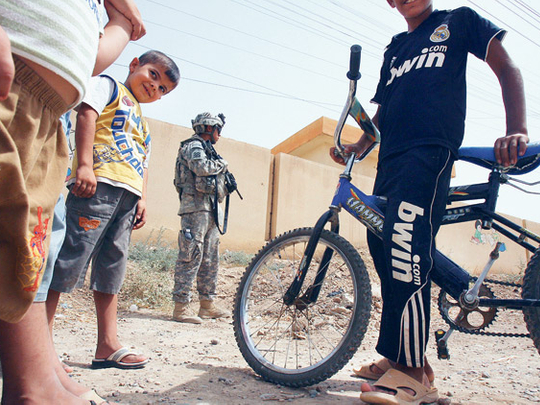
Dubai: Young Iraqis might come from one of the Arab world's wealthiest countries, but a survey has revealed they are among the region's least fortunate.
The majority of Iraqi youth can barely read or write, a large proportion has never been to school, and more than half of them don't know how to use a computer, a recent survey has revealed.
Moreover, researchers said it was hard to say if the situation had worsened in recent years because there was little available information about the previous two decades.
Dr Georges Georgi, Iraq office representative of United Nations Population Fund (UNFPA), said: "The status of Iraqi youth received much more interest and digging only recently." "So we don't have comparative [figures]."
Apart from insufficient data from the era of former Iraqi president Saddam Hussain, another reason it was difficult to compare the past and present status of Iraqi youth was the loss of a considerable amount of information shortly after the collapse of the former regime in April 2003.
No proper education
Like all the Arab countries and most third-world nations, a high percentage of the Iraqi population is young: nearly half of Iraq's 30.7 million population is under the age of 19.
But almost all of Iraq's younger generation was born after the UN imposed sanctions on Iraq in August 1990, which lasted for 13 years. And almost all of Iraqi's youth witnessed the 2003 war. They have been raised amid violence.
The older generation witnessed the previous eight-year Iran-Iraq war and the 1990-second Gulf war.
Today, Iraqi youth are living in a country which is in political chaos. Nearly 300,000 Iraqi youth aged between 10 and 18 have never attended school, a joint survey conducted by United Nations Population Fund (UNFPA) and the Iraqi government found.
"While we can't say whether the present status of Iraqi youth is better or worse than before, we can compare their status with other youths in neighbouring countries, such as Jordan, Syria, Lebanon," Georgi told Gulf News.
"Then, we will notice that Iraqi youth rank below their counterparts in other Arab countries. Iraqis are not the worst in certain areas, but they are way below others. For example, the percentage of Iraqi youth in elementary and secondary education is worse than in other countries.
"Only 40 per cent of Iraqi youth continue their secondary education. Sixty per cent of them drop out after the elementary years. The percentage of students at high schools continues to decrease and only 25 per cent are enrolled in high school."
Researchers said the low percentage of Iraqi youth entering high school was a consequence of the previous regime some 20 years back, when the focus was on building armies rather than educating people.
This explained the disparity in the number of elementary and secondary schools: there are nearly 16,000 elementary schools and just 4,000 secondary schools in Iraq.
"Is this all relative?" Georgi asked. "The bottleneck in the education system is in the big number of elementary schools, which decreases at the secondary level and becomes even less at the higher level."
However, the solution was not just about building more schools in a country which was rich in natural resources, including oil and gas, he said.
"It needs a political will," the UN official said.
Education should be compulsory not only for the first six, but for the first nine years, and there should be efforts to enforce the law.
High dropout rate
Parents, schools and the wider society should work together to ensure children stayed at school, he said.
Education, experts stressed, was about more than reading and writing. It played an important role in self-development, and in boosting the ability of members of a large proportion of the Iraqi population, to handle social problems on a daily basis.
Georgi refuted the suggestion that the country's security situation was a reason for the high dropout rate among students.
Georgi said he strongly believed that the main reason young people in Iraq didn't continue with their education was due to the "weakness" of secondary education in Iraq — where there were too few high schools — coupled with a lack of conviction by parents that their children must be properly educated.
"This phenomenon [drop-out] applies to all Iraq's governorates, from Dohok [in the north within the Kurdish autonomy] to Basra [in the south] ... And the security situation is hot in [only] some parts. Should we take the security situation as the pretext for everything and in all parts of Iraq? This is not possible," Georgi said.
Fast facts
- Slightly more than 300,000 Iraqis aged 10-18 years have never attended school.
- At the time of conducting the interviews for the survey only half of males aged 19-24 said they had worked in the past week.
- 70 per cent of Iraqi youth participated in the last parliamentary elections in March 2010 and 86 per cent said they would take part in future elections.
- 62 per cent of the youth interviewed believe that a family member can kill a female for dishonouring her family.
- 92 per cent agreed that a woman should seek permission before looking for work.
The fact sheet is based on The Iraq National Youth and Adolescent Survey conducted by the Government of Iraq and UNFPA released in early 2010. The fact sheet is jointly published by the United Nations Population Fund and the UN Inter-Agency Information and Analysis Unit.












